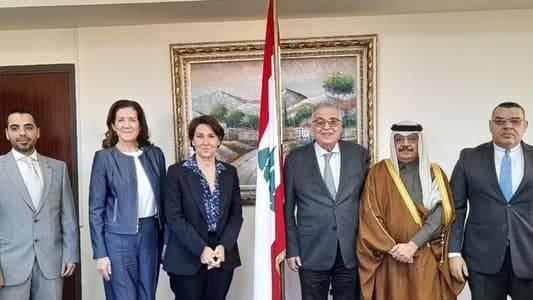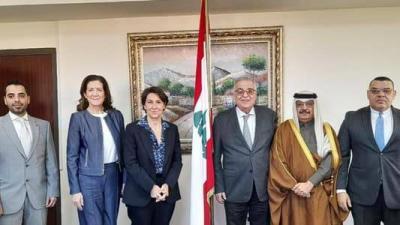Lebanon continues to deteriorate on all levels, with no signs of relief on the horizon to instill optimism for halting the complete collapse, amidst the continuous surge in the dollar exchange rate, which has stripped the national currency of its purchasing power, and the deadlock surrounding the election of a president. Legislative sessions to address urgent matters have not been convened, and opening dialogue channels to explore potential solutions for extricating Lebanon from its crisis seems impossible.
The Lebanese government was awaiting a delegation of ambassadors from the five countries, who gathered representatives in Paris to bring good news about intervention to save Lebanon. However, it was surprised to find that the responsibility was placed on the parliament, in light of its obstruction of the presidential election. The ambassadors called for ending the presidential vacancy while emphasizing that this should be coupled with the caretaker government's response to the international community's requirements, starting with the necessary reforms to assist Lebanon out of its crises.
After meeting with Presidents Nabih Berri and Najib Mikati, the ambassadors had a meeting yesterday with Foreign Minister Abdullah Bou Habib, attended by France's Ambassador Anne Grillo, the U.S. Ambassador Dorothy Shea, Egypt's Ambassador Yasser Alawi, Qatar's Ambassador Ibrahim Abdulaziz Al-Sahlawi, and the Chargé d'Affairs of the Saudi Embassy in Lebanon, Faris Hassan Al-Amoudi.
The ambassadors stressed the "necessity of expediting the election of a president." They also confirmed the need to commence the necessary economic and financial reforms, informing Bou Habib that the five countries would keep their meetings open to monitor developments. The ambassadors reiterated this necessity during their meeting with Presidents Berri and Mikati, emphasizing that the election of a president should not pose a challenge to any party and should be acceptable both regionally and internationally.
Thus, the ambassadors have returned the ball to parliament, holding it responsible for the lack of consensus on a president, while asserting that their countries do not intervene in the names of the candidates and do not favor one candidate over another, provided that the chosen candidate does not challenge any party.
In this context, sources indicated that Mikati insisted before the ambassadors not to personally bear responsibility for the obstacles delaying the presidential election, highlighting his abstention from running for the parliamentary elections and the absence of a parliamentary bloc. The fragmentation among Sunni MPs was not the cause of the electoral obstruction since they did not boycott the sessions.
Sources pointed out that the ambassadors spoke with those they met in a warning tone, which served as a notice of the consequences Lebanon would face due to the specifications of the international roadmap that Lebanon was supposed to adhere to for its salvation. The conversation between the ambassadors and Berri hinged on holding parliament accountable for the continuation of the presidential vacancy, with Berri being candid in stating that Lebanon has weeks to save itself, as the situation worsens and cannot endure further waiting.
Berri reportedly expressed no issue with calling parliament again for a session to elect a president, but the existing divide among MPs obstructs the election process, leading sessions to end as farces, similarly to previous ones. He confirmed that his call for dialogue did not come from a void but from his "awareness that there must be a breach in the deadlock to avoid remaining trapped in a vicious cycle." He noted that his invitation was met with refusal from the "Christian duo," referring to the "Lebanese Forces" and the "Free Patriotic Movement."
He saw a necessity for MPs to meet halfway and posed the question to the ambassadors: how can they overcome the vertical division in parliament as long as each side turns its back on the other and refuses to communicate for a consensus on a president who does not challenge anyone? Is the problem in not calling for a new election session, or does it stem from the fact that the results would mirror those of the past given the absence of multiple candidates? Berri revealed he had been proactive in addressing the presidential election in his speech at the rally organized by the "Amal Movement" commemorating the disappearance of its founder, Imam Musa al-Sadr, and he called for electing a president who unites rather than divides the Lebanese and is open to Arab countries. He affirmed that he remains steadfast in this stance; particularly since no bloc in parliament currently possesses the ability to ensure the attendance of a two-thirds majority, which is a condition for holding the session and electing a president with 65 votes or more, equivalent to half the number of MPs plus one.
A diplomatic source close to the ambassador delegation commented on Berri’s call for consensus on a president who does not pose a challenge to anyone, stating to "Asharq Al-Awsat" that Berri retains the final word on this matter, exercising caution in publicizing it for two reasons: first, to respect his ally, former MP Sleiman Frangieh, and second, to appreciate his strategic alliance with "Hezbollah." He may later realize the difficulty in securing the support of 65 MPs for Frangieh, thus necessitating his engagement in finding a consensual candidate. This is what the countries of the quintet meeting await from him, leaving their consultations open for parliamentary blocs to decide to meet them halfway to facilitate the election of a president for the republic.




